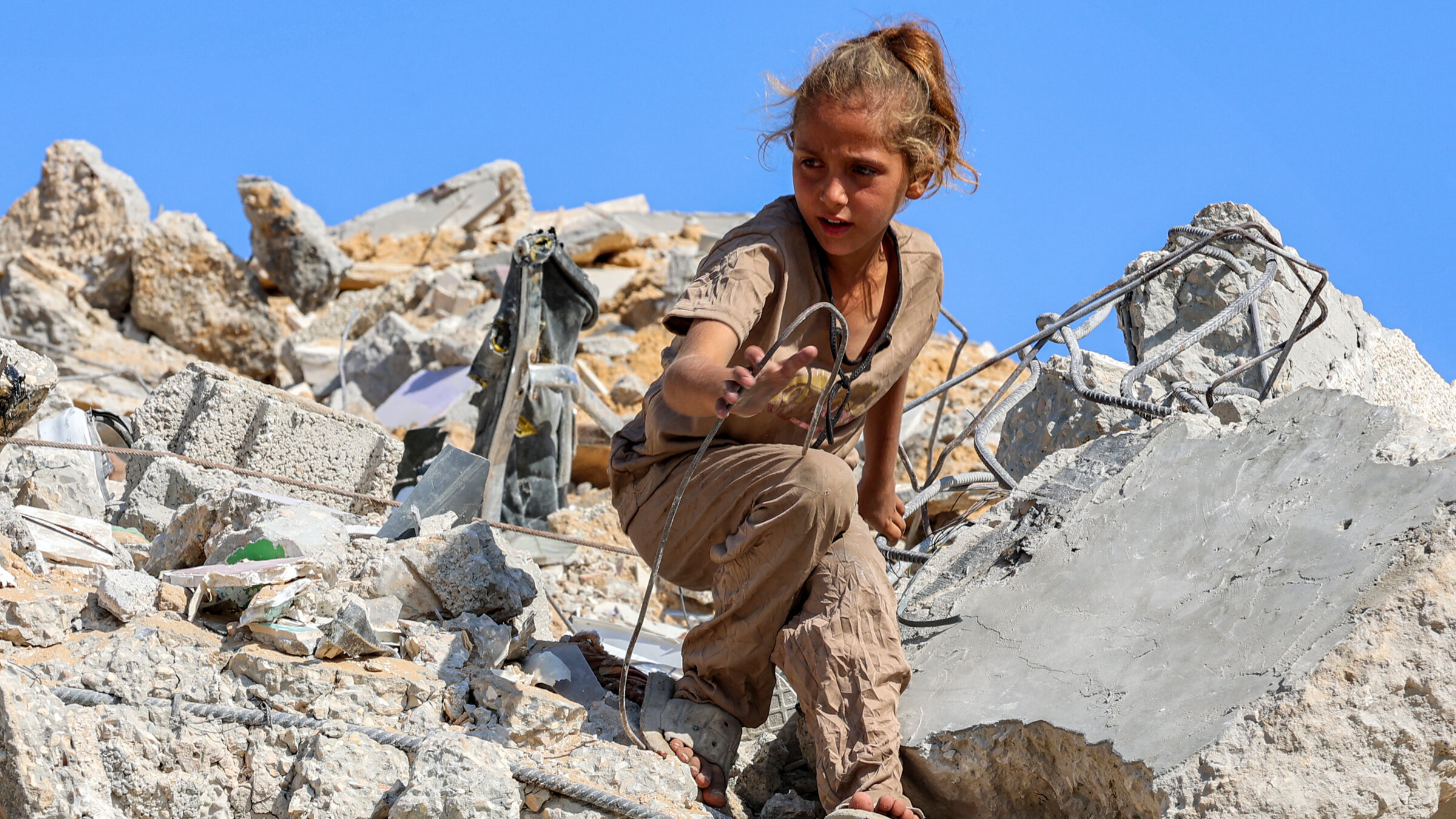‘For the sins we have committed’: Reimagining Yom Kippur liturgy in a post-Oct. 7 world
This year, the traditional confessional prayer Jews recite is not enough.

A Palestinian girl searches for salvage in the rubble of a bombed high rise building, Gaza City, Sept. 6. Photo by Omar Al-Qattaa/AFP via Getty Images
Hovering over this 5786 holiday season is a sense of moral and spiritual crisis that calls out for liturgical innovation. The horrific events of Oct. 7 and Israel’s ensuing brutal campaign in Gaza have left many Jews in a shattered state. We feel angry, perplexed and ashamed, and this year’s work of teshuvah is different. Our liturgy must be different as well.
The great nineteenth-century German-Jewish scholar Leopold Zunz observed that “the liturgy of today is the fruit of a thousand years’ development.” The prayers and ritual formulations that Jews use regularly have constantly evolved and transformed over time, responding to differing needs, tastes and events.
A catalyst to these changes is often crisis, such as in the aftermath of the destruction of the Second Temple or during the Crusaders’ murderous rampages in the Middle Ages. These events yielded a new form of poetic dirge called the kinah, recited on Tisha B’Av, which sought to console Jews by reminding them that they were part of a long chain of tradition that both suffered and survived. The advent of modernity, including the Jewish Enlightenment and the creation of the State of Israel, also occasioned important modifications and additions to traditional Jewish liturgy in ways that spoke to Jews’ shifting needs and sense of God.
In addition to the personal work of atonement in which we must each engage as individuals, it strikes us that this year Jews have an added obligation of undertaking a collective assessment of our behavior as Jews, and particularly as Jews who feel a deep connection to both the Jewish and Palestinian peoples. The established liturgy takes us only so far. To address the crisis-moment Jews inhabit, we are proposing an addition to one of the most important and solemn portions of the Yom Kippur service: the Vidui.
The Vidui (confession) section calls on us to name our sins and give symbolic physical expression to our atonement by striking our chests at the recitation of the transgressions we have committed. The Vidui section is divided into two parts: the “small confession,” when we strike our hearts at the mention of a list of sins, and the “big confession,” a set of fifty-three verses each beginning with the words Al Chet she chatanu: “for the sin we have committed.” The verses generally refer to personal failings such as harmful speech, hard-heartedness or lying.
These verses alone are not adequate this year. We are a professor of Jewish history and a rabbi and teacher, respectively, and we are both observant Jews. Together, we have composed a special list of “Al Chets” to include in the Yom Kippur prayers of American Jews. The verses are intended to prod us to take stock of what has been done in our name as Jews to Palestinians in Gaza and the West Bank, as well as to ask whether we have done enough to bring home the Israeli hostages.
Abraham Joshua Heschel memorably observed in his book The Prophets that while some are guilty, all are responsible. It is understandable that many American Jews may not feel responsible for Israel’s actions in Gaza. But Heschel also warned us against “the evil of indifference,” when we turn a blind eye to the suffering of the other. To do so does not require the denial of self, but it does demand an honest reflection on whether one has averted one’s gaze from an unfolding disaster.
In this time of crisis, the traditional liturgy offers a framework for processing our sense of responsibility. This is particularly so during the Jewish holiday season, and particularly in the period from Rosh Hashanah to Yom Kippur, known as aseret yemei teshuvah — the ten days of repentance (teshuvah literally means “return”). Perhaps the principal mode of commemorating the Jewish new year is by engaging in the process of teshuvah.
Teshuvah involves acknowledging our misdeeds, expressing regret and pledging not to repeat the offense. It begins with an articulation of what we’ve done. We all know from our personal interactions how difficult it is to admit to our own flaws, how strongly we are inclined to resist transformation and deny responsibility for our actions. Taking steps to enumerate and articulate our flaws is the beginning of a breakthrough to our hearts and minds. It is a true cheshbon hanefesh, accounting of the soul. And it sets us on the path of return.
At this critical juncture, Jews must overcome our own sense of victimization to look inwards and accept responsibility for not doing enough — through silence, indifference or self-justification — to bring to an end a true humanitarian and moral disaster. We also must resist the inclination, as the Israeli thinker Yeshayahu Leibowitz admonished in his famous 1953 article “After Kibiyeh,” to wrap state actions in the veil of religious sanctity.
This is not just a political challenge; it is a profound spiritual challenge as well. We must act to repair the situation. And we do so by engaging in an accounting of the soul, by embarking on the path of teshuvah whose formula is “for the sins we have committed.”
Al Chet additions for 5786
- Al Chet for the sin of sullying the name of God and Judaism.
- Al Chet for the sin of abandoning the mitzvah of redeeming the captive.
- Al Chet for the sin of bringing death and devastation upon our neighbor.
- Al Chet for the sin of imposing our own suffering on the other.
- Al Chet for the sin of denying our neighbor’s right to live.
- Al Chet for the sin of violating the dignity of other human beings.
- Al Chet for the sin of waging a war of revenge
- Al Chet for the sin of starving people, especially innocent children.
- Al Chet for the sin of stealing another’s land.
- Al Chet for the sin of mastery and supremacy over others.
- Al Chet for the sin of indifference and blindness.
- על חטא שחטאנו לפניך בחלול השם
- על חטא שחטאנו לפניך בדחיית מצוות פדיון שבויים
- על חטא שחטאנו לפניך בהרג ובהרס שגרמנו לשכנינו
- על חטא שחטאנו לפניך בכפיית סבלנו על זולתנו
- על חטא שחטאנו לפניך בהכחשת זכות קיום לשכנינו
- על חטא שחטאנו לפניך בהפרת כבוד האדם
- על חטא שחטאנו לפניך במלחמת נקמה
- על חטא שחטאנו לפניך בהרעבת אנשים, נשים וטף
- על חטא שחטאנו לפניך בגזילת רכוש שכנינו
- על חטא שחטאנו לפניך באדנות ובעליונות
- על חטא שחטאנו לפניך באדישות ובעיוורון














